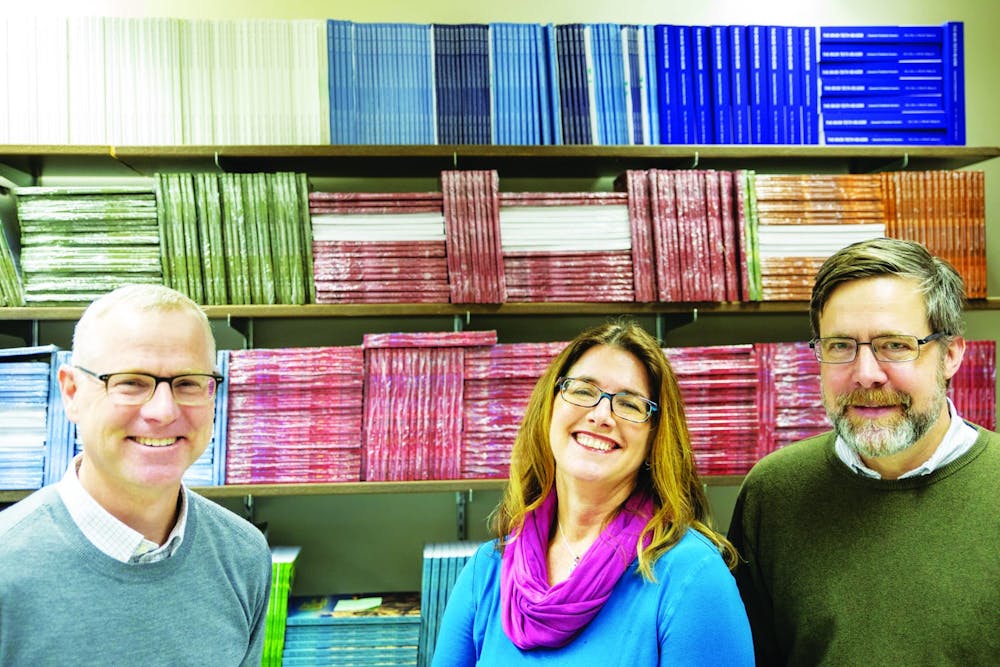Submissions for “River Teeth’s” next issue are open until May 1, 2020.
“In a world that can sometimes be lacking in empathy and deep thinking, I think ‘River Teeth’ makes space for the opportunity to inhabit another human being’s experience in a meaningful way,” said Jill Christman, senior co-editor of the creative nonfiction journal “River Teeth.”
This year, the biannual literary journal is celebrating its 21st anniversary and its move to Ball State University from Ashland University. To date, both the spring and fall 2019 issues were published from Ball State.
While Joe Mackall and Dan Lehman, “River Teeth’s” founding editors, are the literary journal’s editors-in-chief, they work closely with Ball State English professors Christman, Mark Neely and Todd McKinney to publish “River Teeth.”
Neely said “River Teeth” receives roughly 2,000 submissions each year, and the journal has an acceptance rate of about 2 percent for publishing.
“Being an editor means you have to say, ‘No,’ to a lot to people who have put a lot of work into something,” Neely said. “They’re wonderful, amazing writers, but unfortunately, we have to make really hard choices for publishing.”
Even though decisions can be difficult, McKinney said, there are also rewarding aspects of editing and selecting pieces.
"Encountering the stories that writers want to share is a real pleasure,” McKinney said. “With the writers and as a community, we all get to help bring these pieces up. Working and talking with the writers about their essays is really insightful and helps us as editors bring light to their work.”
Because of the quality of all submitted essays, the editors all said it is difficult to choose one favorite piece, but Christman said her favorite essays are the pieces from which she learns something new and feels a connection to the author’s personal journey.
In addition to the “River Teeth” journal, Ball State is also the publishing grounds for a “River Teeth” sub-magazine, “Beautiful Things,” which accepts micro-essay submissions of 250 words or fewer to publish online and deliver to email subscribers once a week.
McKinney works with Christman and English department graduate student Valerie Weingart to publish “Beautiful Things” essays, as well as update “River Teeth’s” website and its social media.
“To be given the opportunity to work with ‘River Teeth’ as a graduate student is like a dream come true,” Weingart said. “I’ve had to get comfortable with communicating with people who have a lot more experience than I do who are important figures in the literary world. I was a little bit starstruck for a while, and I still am a little bit, but I’m getting comfortable with that, and I definitely don’t take these opportunities for granted.”
Christman and Neely, who are both teaching creative nonfiction classes this semester, said they are excited to share “Beautiful Things” essays with their students.
Neely also said there may be future options for students to better understand the editing process through the new “River Teeth” Learning Lab. Currently, Neely is recruiting interns to attend classes and help students learn more about creative nonfiction writing.
“Moving ‘River Teeth’ to Ball State gives us the opportunity to start building our program in literary publishing and give students the opportunity for hands-on learning,” Christman said.
McKinney said he hopes reading memoirs and creative nonfiction motivates people to think about how they can relate to the author’s experiences.
“When students, or just readers in general, read ‘River Teeth’ essays, I think it gives them permission to examine their river teeth moments and figure out the emotional journey that they’re on and what it means to them,” McKinney said.
Each of the faculty editors said they have high hopes for the future of “River Teeth” at Ball State, and one of their collective goals is to involve as many students as possible.
“Hopefully, we’ll have 20 more years of ‘River Teeth,’” Christman said. “We want to continue to build a place where authors are proud to have their work [published] and feel like we’re taking good care of their work and of them as writers.”
Contact Grace McCormick with comments at grmccormick@bsu.edu or on Twitter @graceMc564.





